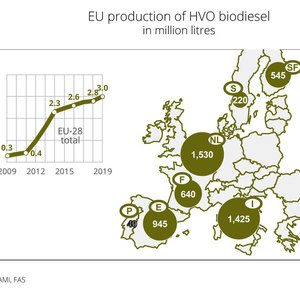Petroleum companies ramp up HVO production in Europe

August 15, 2019
BY UFOP
Production of hydrotreated vegetable oil (HVO) in the European Union has picked up pace since 2012. Petroleum companies, such as Neste, Eni and Total, were the main entities promoting the creation of corresponding capacities. From the perspective of the Union zur Förderung von Oel- und Proteinpflanzen (UFOP), the key reason for the development is that the indirect land use change (iLUC) regulation introduced in 2015 permits that biofuels from waste oils and fats can be counted double. At the same time, pressure on prices has increased in the international vegetable oil markets.
Palm oil has become cheaper and cheaper relative to soybean and, above all, rapeseed oil. Plant operators can order the feedstock flexibly, depending on price. However, the oil company Total underestimated the opposition from French farmers in June 2018. The farmers staged a massive protest against Total’s plans to initially use approximately 0.5 million tonnes of palm oil as a feedstock at La Mède. This translates to about 0.14 million hectares of additional palm oil plantations.
Advertisement
HVO plants can use a wide range of feedstocks, such as native vegetable oil, animal fats, fish oil and used cooking oil, as well as oils that are byproducts of different industrial processes, such as tall oil from the wood and paper industries, palm oil mill effluent and palm fatty acid distillate (PFAD). In view of these feedstock options, UFOP has urged the EU to step up certification and documentation requirements.
HVO output in the EU is estimated at 2.8 billion liters (740 million gallons) in 2018 and expected to rise slightly to 3 billion liters in 2019. The planned production facilities in France and Italy are expected to boost production to 3.5 and 4.5 billion liters respectively from 2020 onwards. These volumes are major factors in making the EU the largest producer of alternative diesel fuels in the world. According to information published by Agrarmarkt Informations-Gesellschaft mbH (AMI), production of biodiesel including HVO in 2019 will amount to around 14.2 billion liters.
Advertisement
HVO is made by saturating the double bonds in the fatty acid molecules of vegetable oils and animal fats with hydrogen. Propane is produced as a byproduct. The product can be modified in the HVO production process, so that HVO can be blended with fossil fuels at 7 percent (the same as biodiesel) or more to make renewable diesel or biokerosene. This means that HVO can be incorporated specifically and irrespective of the time of year (winter quality) for existing vehicle fleets in the carriage of goods or in traditional kerosene. Contrary to fatty acid methyl ester (biodiesel) production, this method involves very high investment costs.
Along with the option of double counting and superior greenhouse gas (GHG) reduction values compared to conventional biodiesel from vegetable oils, the feedstock price is key to the preference of using HVO. UFOP has noted that the European biodiesel industry is challenged to accept this competition for GHG efficiency and further improvement of product quality as a prerequisite to ensure its future competitiveness. UFOP supports, within the scope of its resources, research projects on biodiesel and rapeseed oil fuels.
Related Stories
A bill to formally adopt a revenue certainty mechanism to support the production of SAF was introduced in the U.K. Parliament on May 14. The proposed scheme is in the form of a guaranteed strike price.
Delta Air Lines on May 7 announced its strong support for new bipartisan, bicameral legislation that will accelerate the growth of sustainable aviation fuel (SAF) in Michigan. The bill aims to create a SAF tax credit of up to $2 per gallon.
The U.S. EPA on May 14 delivered two RFS rulemakings to the White House OMB, beginning the interagency review process. One rule focuses on RFS RVOs and the other focuses on a partial waiver of the 2024 cellulosic RVO.
U.S. EPA Administrator Lee Zeldin on May 15 told members of the House Appropriations Committee that the agency is working as quickly as it can to take action on the backlog of RFS small refinery exemption (SRE) petitions.
The U.S. EPA on May 15 published data that shows eight new small refinery exemption (SRE) petitions have been filed under the RFS in the past month. According to the agency, 169 SRE petitions are now pending.
Upcoming Events










